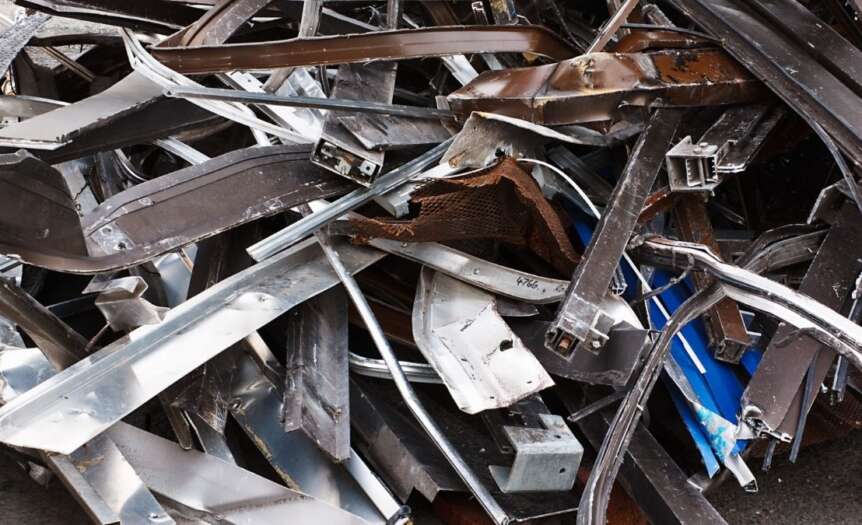Some jobs never go out of style—scrap collecting, for one. Scrap collecting has existed ever since someone saw the benefits of reclaiming and turning in old metal or other materials to a dealer for money. If you’d like to start a full-time job as a scrap collector or a part-time side gig, here are several tips for starting a scrap metal collecting business.
Plan Ahead
Scrap collecting seems simple—drive around and look for metal people toss away. But if you intend to make a profit, you need to make a business plan. Project your expenses. For a low-level operation, you’ll need at least a few tools. These include a truck, hand tools and a blow torch for breaking down larger pieces, and a place to legally store and sort materials until you can sell them. Know your local laws. You may have to purchase a license to collect scrap as well. Insurance isn’t a bad idea either since it’s possible to injure yourself on the job. Know in advance what to do regarding both first aid and personal injury proceedings.
Find Clients and Buyers
Naturally, you won’t have much of a scrap collecting business without people willing to give you scrap. You can pick up scrap off the street, of course, but this is just one way to acquire it. Construction and demolition companies may let you collect scrap from their sites. Auto shops and used car dealerships may want to get rid of old stock. Homeowners may be eager to have old appliances taken away as well. As for selling, the biggest purchasers of scrap include junkyards, recycling companies, metal foundries, and the like. But be aware that many of these places may already have contracts and arrangements with other collectors. Still, keep your eyes and ears open and watch for money-making scrap that can be yours for the taking.
Stay on the Right Side of the Law
One of the biggest tips for starting a scrap metal collecting business is to keep it legit. Unscrupulous scrappers steal from construction sites, for example. But that’s an obvious crime. In general, avoid the appearance of illegitimacy. Even if an item seems like trash, seek permission before hauling it off. Closed factories and comparable sites provide a tempting array of large metal objects like broken-down machinery and abandoned vehicles. However, you run the risk of being arrested for trespassing or stealing if you’re caught on the premises. Always ask permission to scrap first—get the permission in writing.
Know Your Stuff, Then Collect It
Not all metals are the same. Learn to recognize the diverse types and what your clients will pay for. In general, scrapyards are willing to pay for aluminum, certain steels and irons, nickel, zinc, brass, tin, and copper. Read up on the tools and terms of the trade so you can better deal with your buyers. Finally, wear protective materials and learn to recognize hazardous materials while you collect and sort your stock.
Scrap collecting is a grubby job, but someone needs to do it and profit from it besides!










 Deering Estate
Deering Estate
 Massage Envy South Miami
Massage Envy South Miami
 Calla Blow Dry
Calla Blow Dry
 My Derma Clinic
My Derma Clinic
 Sushi Maki
Sushi Maki
 Sports Grill
Sports Grill
 The Healthy Kitchen
The Healthy Kitchen
 Golden Rule Seafood
Golden Rule Seafood
 Malanga Cuban Café
Malanga Cuban Café

 Kathleen Ballard
Kathleen Ballard
 Panter, Panter & Sampedro
Panter, Panter & Sampedro
 Vintage Liquors
Vintage Liquors
 The Dog from Ipanema
The Dog from Ipanema
 Rubinstein Family Chiropractic
Rubinstein Family Chiropractic
 Your Pet’s Best
Your Pet’s Best
 Indigo Republic
Indigo Republic




 ATR Luxury Homes
ATR Luxury Homes


 2112 Design Studio
2112 Design Studio
 Hamilton Fox & Company
Hamilton Fox & Company
 Creative Design Services
Creative Design Services
 Best Pest Professionals
Best Pest Professionals
 HD Tree Services
HD Tree Services
 Trinity Air Conditioning Company
Trinity Air Conditioning Company
 Cisca Construction & Development
Cisca Construction & Development
 Mosquito Joe
Mosquito Joe
 Cutler Bay Solar Solutions
Cutler Bay Solar Solutions


 Miami Royal Ballet & Dance
Miami Royal Ballet & Dance
 Christopher Columbus
Christopher Columbus
 Pineview Preschools
Pineview Preschools
 Westminster
Westminster
 Carrollton
Carrollton
 Lil’ Jungle
Lil’ Jungle
 Frost Science Museum
Frost Science Museum
 Palmer Trinity School
Palmer Trinity School
 South Florida Music
South Florida Music
 Pinecrest Orthodontics
Pinecrest Orthodontics
 Dr. Bob Pediatric Dentist
Dr. Bob Pediatric Dentist
 d.pediatrics
d.pediatrics
 South Miami Women’s Health
South Miami Women’s Health

 The Spot Barbershop
The Spot Barbershop
 My Derma Clinic
My Derma Clinic




 Miami Dance Project
Miami Dance Project

 Rubinstein Family Chiropractic
Rubinstein Family Chiropractic
 Indigo Republic
Indigo Republic

 Safes Universe
Safes Universe
 Vintage Liquors
Vintage Liquors
 Evenings Delight
Evenings Delight





 Atchana’s Homegrown Thai
Atchana’s Homegrown Thai
 Baptist Health South Florida
Baptist Health South Florida

 Laser Eye Center of Miami
Laser Eye Center of Miami
 Visiting Angels
Visiting Angels
 OpusCare of South Florida
OpusCare of South Florida

 Your Pet’s Best
Your Pet’s Best





 HD Tree Services
HD Tree Services
 Hamilton Fox & Company
Hamilton Fox & Company


 Creative Design Services
Creative Design Services